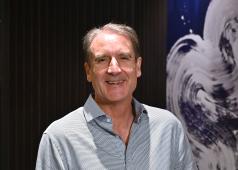PACE blog - Shaping Tomorrow : Insights from the PACE Programme's facilitator, Neil Gibson
The first cohort of ADEPT and Amey’s Pioneering, Action-orientated, Creative and Entrepreneurial (PACE) programme took place between May and December 2023. Neil Gibson, the facilitator, reflects on how the programme develops thought leadership skills.
Thinking critically in the Rubik’s cube of place
Creating better communities requires place directors to embrace thought leadership and behavioural insight, fostering creative problem solving and innovative solutions. However, the current landscape for local authority directors is more challenging than ever before, with heightened financial pressures, uncertainties and complex political scenarios.
This means that senior place leaders often struggle to allocate dedicated time for critical reflection in the face of immediate operational challenges.
Challenges of place directors: PACE's call to action
To help address this, the PACE Programme was launched in 2023 by Amey and ADEPT – it aims to create space for senior place leaders to find strategic solutions to the wicked issues facing the public sector. Designed exclusively for place directors and senior leadership, the principle behind PACE is to influence the future of place-focused strategies and support place leaders in driving change.
PACE specifically targets executive directors, corporate directors and senior leaders from local authorities, extending invitations to senior executives from central government. It brings together the private sector with local and central government, adding richness and diversity to the debate.
At its core, the PACE programme has two objectives. Firstly, to provide senior place leaders with the time, environment and a peer group to think about significant issues they face in their day-to-day roles. Secondly, it aims to generate outcomes or outputs from that can be shared across the sector, offering valuable insights, tips, toolkits and ideas.
When we selected the participants, we wanted to create a diverse cohort, with a range of intentionally different perspectives, in order to stimulate creativity and innovation.
Expert insights and impactful sessions
At the very beginning, the cohort agree a theme for the programme - each subsequent session delves into different aspects of this theme. For instance, the 2024 cohort has selected the theme 'Making a stronger case for place,' concentrating on advocating for place, integrating approaches to place and planning, and investing in place. The overarching objective is to confront challenges through a comprehensive whole system approach, avoiding fragmented solutions.
Each session follows a similar structure, featuring two or three expert speakers, including academics, politicians, and private sector thought leaders. These speakers are briefed on specific challenges set by the cohort, tailoring their contributions to provide creative and disruptive perspectives.
A collaborative workshop follows, where the group collectively dissects the problem statements, finding creative solutions. This process is carefully designed to spark creativity, leading to outcomes that participants can share and implement in their workplaces.
Each PACE session is intentionally held in a prestigious location – this is a deliberate way of creating an inspiring environment for participants, emphasising the significance of the programme and creating a unique space for senior leaders to think differently about challenges - venues have included Churchill's war rooms, the Gherkin, and HMS Belfast.
Nurturing thought leaders
The 2023 cohort were really clear that they wanted the PACE programme to focus on face-to-face interactions – remote working and new technology has created new challenges, with reduced face-to-face interaction time. I think the PACE participants recognised the value of in-person interactions, emphasising body language and personal connections.
I’m already seeing how the programme is having an impact, with senior leaders reporting that they are employing different critical thinking and behavioural change theory in their roles. They’ve formed an informal alumni network, which is resulting in ongoing connections among cohort members. They’ve also acted as advocates for the PACE programme, which led to strong interest for this year’s PACE cohort.
Most importantly, while the programme contributes to participants' professional growth, it has a potential long term impact on the sector.
I’ve been seriously impressed with 2023 PACE cohort, who were spectacular. Their commitment, intellect and energy for effecting positive change are impressive and they all acknowledge the critical role of thought leadership and behavioural insight in creating better places.
Further information
- The PACE summary documents and further information on the programme are on the PACE pages of the website.
Author
- Neil Gibson - Neil is a Past President of ADEPT, PACE Programme facilitator and Chair of the ADEPT Live Labs 2 Commissioning Board

